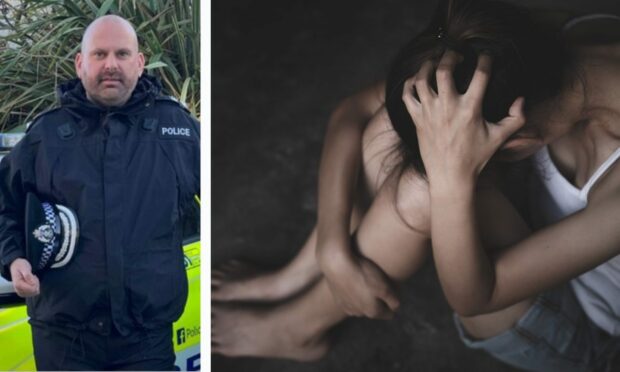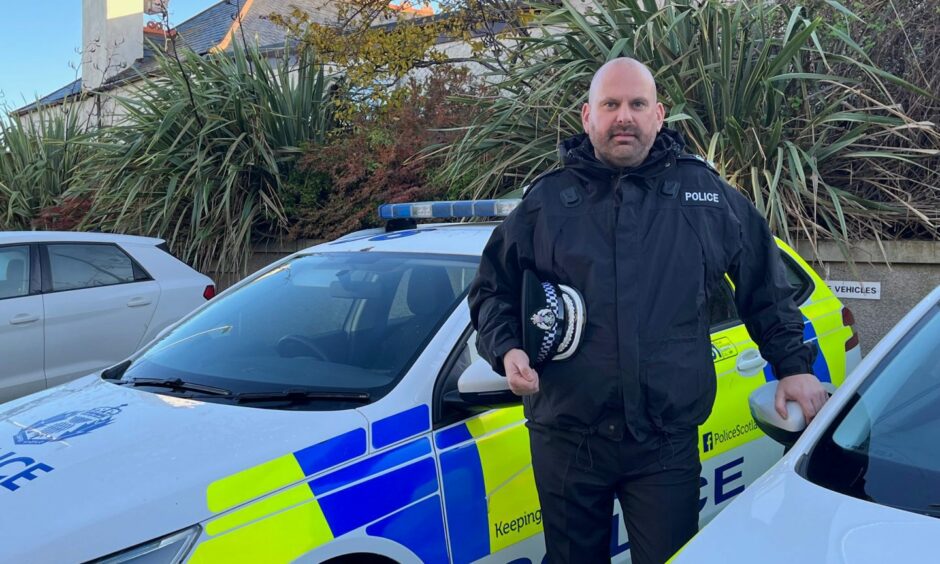The north-east’s new police chief has pledged to tackle violence against women and girls as his “key priority” after getting the region’s top job.
Chief Superintendent Graeme Mackie has replaced Ch Supt Kate Stephen who was moved into a new national role in Police Scotland’s professional standards department.
In his first interview since being appointed, the new divisional commander told the Press and Journal he wants victims of gender-based violence to get a “better response” from the police.
“What we’re trying to do is start to change attitudes and cultures towards sexism and misogyny, with the overarching aim of tackling violence against women and girls,” he said.
“That’s a key priority for myself and Police Scotland.”
The Chief Superintendent has appealed to local communities to take part in a survey about their views of and experiences with Police Scotland.
“I’m really keen to hear how we’re doing and how people feel,” he explained. “We might not always get it right, but I want to know about it so we can rectify and learn from it.
“We’re absolutely committed to working to deliver a better response to gender-based violence and contributing towards changing attitudes on violence against women and girls.”
Ch Supt Mackie said he believes his constabulary has created a supportive environment in which people feel confident to come forward and report their attackers.
“In partnership with local authorities and the third sector, we’ve got an excellent model to support victims of crime,” he said.
“I’ve got absolute confidence in it but actually what’s important is not necessarily my view, it’s the views of the public.”
‘That Guy’ campaign
Scotland’s national police service recently relaunched the ‘That Guy’ campaign which encourages men to challenge their attitudes and behaviour towards women.
But the north-east region’s most senior police boss has admitted that his officers also need to practice what they preach.
He explained that he wants to build a positive work environment in which police personnel also feel safe and valued.
“We know from reviews and inspections and through listening to officers and staff that policing in Scotland is not immune from the cultural challenges seen in other police services, other sectors or industries, or society as a whole.
“Discriminating behaviour and officer and staff misconduct do huge damage to public confidence in policing.
“And rightly so, that’s why we’re held to high standards at work and outside work.”
Recent crime statistics have revealed a rise in the number of murders, attempted murders, serious assaults, rapes and attempted rapes across the north-east.
Between April and September this year, three murders were recorded in the region, compared with two during the same period last year.
Police Scotland’s Quarter Two Performance Report for 2022/23 showed attempted murders increased by 75% to 21 incidents, up from 12 in the previous year’s first two quarters.
There was a 10% spike in serious assaults, from 159 recorded between April and September 2021 to 175 in the same period this year.
And rapes and attempted rapes recorded to the end of this year’s second quarter have rocketed 40% to 139 incidents, up from 99 during the same time last year.
‘The north-east is safe’
But Police Scotland has said the number of crimes reported across the country has actually returned to levels previously seen before Covid lockdowns were imposed.
Ch Supt Mackie explained: “It’s difficult to use data comparatively.
“Because of the pandemic, we were all locked down and we couldn’t go out.
“Now that we’re seeing people come out of lockdown, we’re seeing them going out into towns and cities enjoying themselves.
“Unfortunately, we are starting to see additional violent crimes. Is the north-east more violent than it was pre-pandemic? I would say, no it’s not.
“I’m reassured that the north-east is safe but we’re not immune to violent crime.
“We’re never immune to tragedies, often through bad people doing really bad things.
“We’ve seen people who’ve had a mental health crisis, people that have maybe got undiagnosed mental health matters that nobody knew of before, but the first it’s become known is when tragedy happens and police are there to respond to it.”
According to Police Scotland, violent crimes across the nation – including homicides, serious assaults and robberies – are at their lowest level since comparable records began.
Nationally, the number of attempted murders is lower than last year, the force added.
Violence against police officers
Ch Supt Mackie has served as a police officer for nearly 28 years and prior to his new role he was detective superintendent at the Major Investigation team, overseeing all homicide and major crime investigations across the north-east, Highlands and Islands and Tayside.
Over the last five-and-a-half years, he managed teams of investigators in the north and north-east, who continue to probe high-profile cold cases such as the deadly doorstep shooting of Nairn banker Alistair Wilson in November 2004.
He also coordinated Police Scotland’s investigation of August’s fatal shooting on Skye, which saw father-of-six John MacKinnon, 47, shot dead and three others injured.
The divisional commander told the Press and Journal that, in his new role, he plans to “shine a light” on the challenges his officers and staff face every day, including violence.
“Policing is absolutely relentless,” he said. “There’s no doubt about that but it’s also extremely rewarding.
“I’ve seen the best in humanity and unfortunately the worst as well.
“My police officers aren’t there for people to carry out violence upon them.
“An assault on a police officer should not be regarded as part of the job.
“We need to get to a point where it is not acceptable to think it’s part of the job because it is not part of being a police officer and it should never be regarded as something that the police have to face.”

